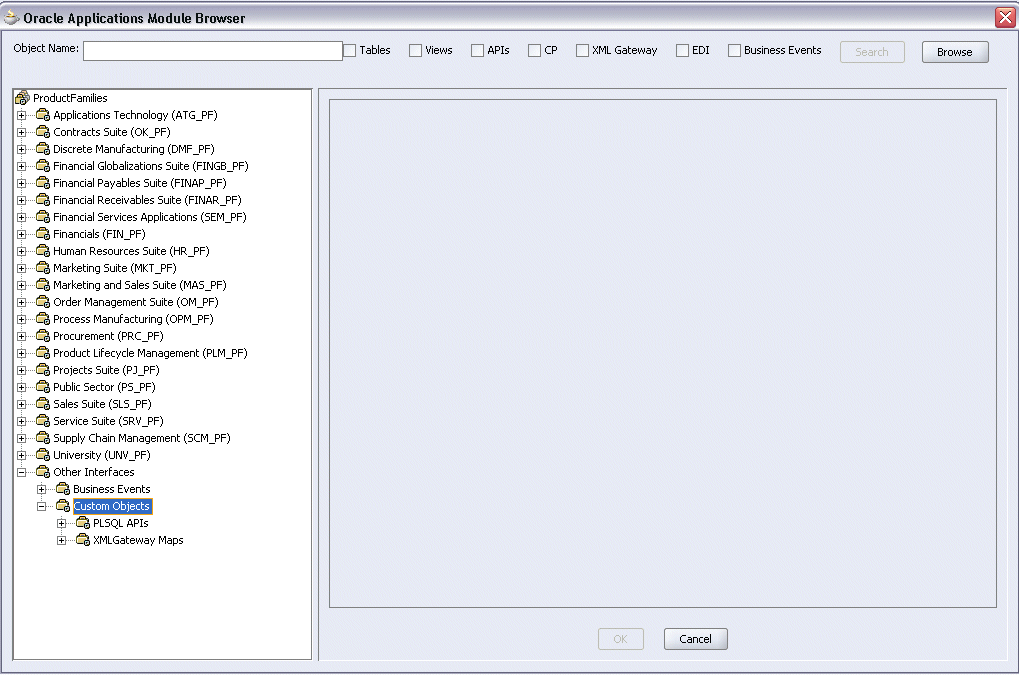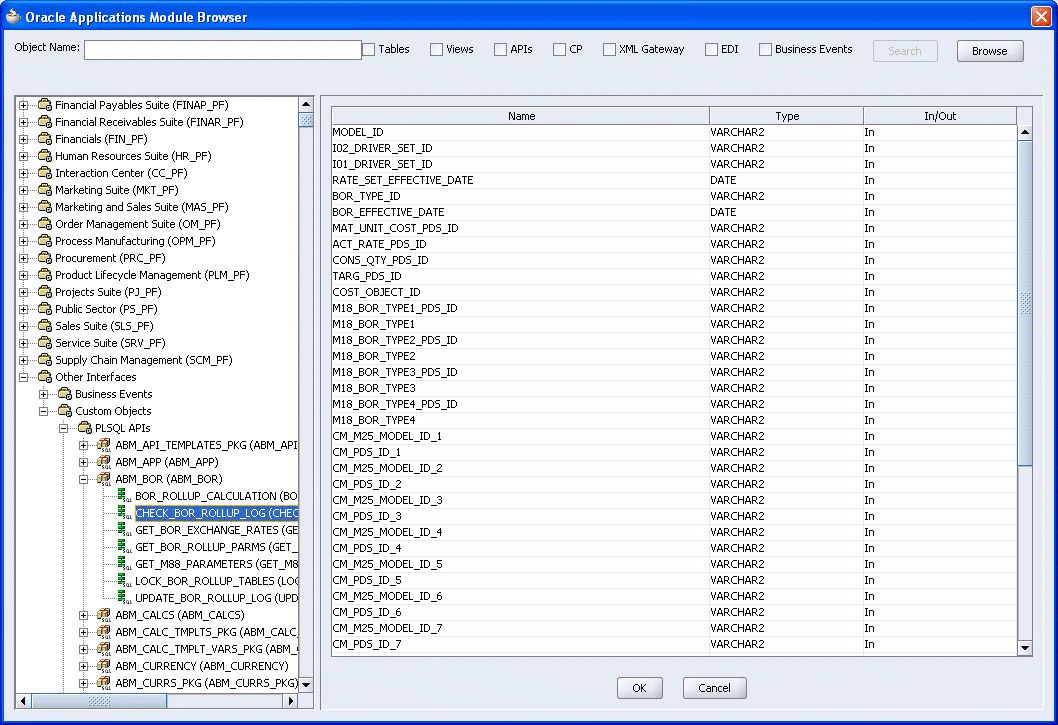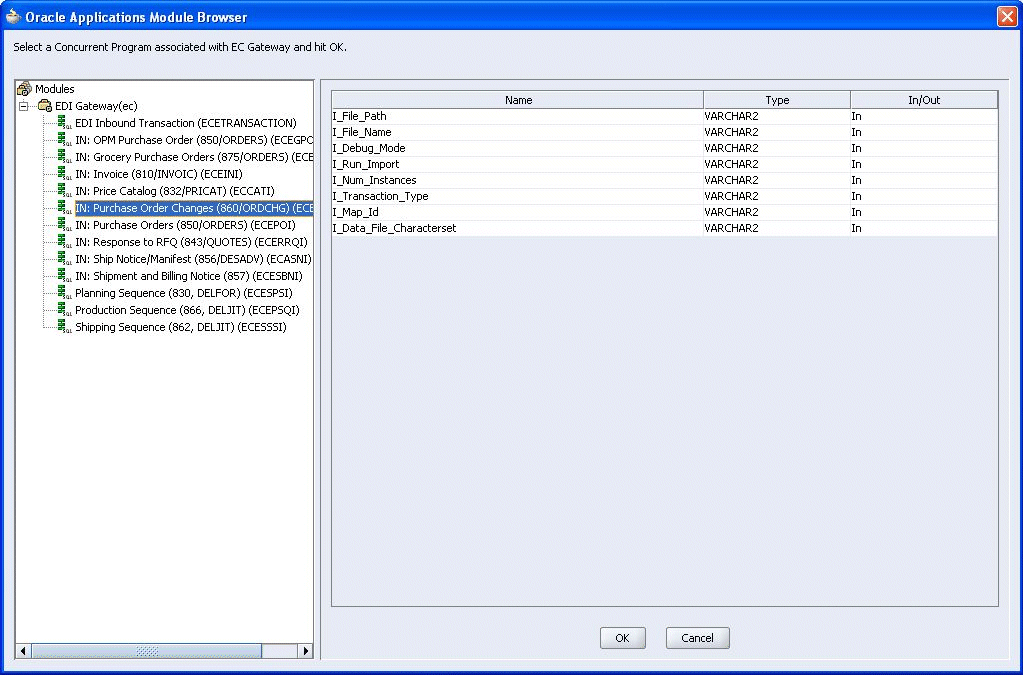11g Release 1 (11.1.1.4.0)
Part Number E10537-03
Contents
Previous
Next
| Oracle Fusion Middleware Adapter for Oracle Applications User's Guide 11g Release 1 (11.1.1.4.0) Part Number E10537-03 | Contents | Previous | Next |
Adapter for Oracle Applications enables you to orchestrate discrete data into a meaningful business process and creates Web services for various interface types within Oracle E-Business Suite. It plays the role of service provider for Oracle E-Business Suite to allow seamless integration between business partners, processes, applications, and end users in heterogeneous environment.
Adapter for Oracle Applications provides the following features which are further discussed in this chapter:
Adapter for Oracle Applications acts as a highly flexible integration interface for Oracle Applications. It supports the following interface types for integrating with Oracle Applications:
PL/SQL APIs
These APIs enable you to insert and update data in Oracle Applications using PL/SQL.
Business Events
A business event is an occurrence in an internet application that might be significant to other objects in a system or to external agents. An example of a business event can be the creation of a new sales order or changes to an existing order.
Oracle Workflow uses the Business Event System that leverages the Oracle Advanced Queuing (AQ) infrastructure to communicate and manage business events between systems. The Business Event System consists of an Event Manager and workflow process event activities. The Event Manager lets you register subscriptions to significant events; event activities representing business events within workflow processes let you model complex business flows or logics within workflow processes.
When a local event occurs, the subscribing code is executed in the same transaction as the code that raised the event. Subscription processing can include executing custom code on the event information, sending event information to a workflow process, and sending event information to other queues or systems.
Open Interface Tables
Interface tables enable you to insert or update data into Oracle Applications. The associated concurrent program should be running to move the data from the interface tables to base tables.
Concurrent Programs
Concurrent programs enable you to move data from interface tables to base tables or execute any application logic.
Oracle XML Gateway
XML Gateway enables bidirectional integration with Oracle Applications. It helps you to insert and retrieve data from Oracle Applications. XML Gateway is a higher-level interface that exposes OAGIS-formatted XML documents for commonly used Oracle Application business objects and business interfaces. XML Gateway integrates with interface tables, Oracle Workflow Business Event System (BES), and interface views to insert and retrieve data from Oracle Applications. It maps the underlying table data to XML and back.
Oracle e-Commerce (EDI) Gateway
Oracle e-Commerce Gateway provides a common, standards-based approach for Electronic Data Interchange (EDI) integration between Oracle Applications and third party applications.
Interface Views
Interface views help you to retrieve data from Oracle Applications using the application tables.
Please note that Adapter for Oracle Applications also supports the following custom integration interface types that are exposed by the Oracle Applications Module Browser, not by Oracle Integration Repository:
Customized PL/SQL APIs
Customized Business Events
Note: Business events integration interface type is also exposed by Oracle Applications Module Browser, not by Oracle Integration Repository.
Customized XML Gateway Maps
Oracle Integration Repository, an integral part of Oracle E-Business Suite, is a prebuilt catalog of information about the numerous public integration interfaces delivered with Oracle Applications. It provides a comprehensive view of the integration interfaces with details for Oracle E-Business Suite.
Oracle Integration Repository can only provide information about an integration interface that has been specifically annotated by the developer to make it public. Adapter for Oracle Applications takes advantage of the annotations that have already been created to make the following integration interface types visible in the Oracle Applications Module Browser:
XML Gateway message maps
PL/SQL APIs
Concurrent programs
Open Interface tables
Interface views
e-Commerce Gateway EDI messages
These integration interfaces are exposed as Web services, and are available for process orchestration through the Oracle BPEL Process Manager.
For more information about Oracle Integration Repository, see the Navigating Through Oracle Integration Repository section, Oracle E-Business Suite Integrated SOA Gateway User's Guide. This guide is part of the Oracle Applications documentation library. Oracle Applications documentation can be accessed with the following link:
http://www.oracle.com/technology/documentation/applications.html
Note: Oracle Integration Repository is integral part of Oracle E-Business Suite Release 12.0 onwards; however, it is available as hosted environment for the Release 11.5.10 version at http://irep.oracle.com.
Oracle Adapter for Oracle Applications leverages Integration Repository for Oracle E-Business Suite Release 11.5.10 and Release 12 as the source of truth for the integration content. However, the implementation is based on the version of Oracle E-Business Suite. For pre-Release 11.5.10 instances, Oracle Adapter for Oracle Applications connects directly to the application database for information on integration interfaces. Adapter for Oracle Applications also supports selecting custom integration interfaces and the design-time navigation steps to reach to these custom interfaces depending on the following versions of Oracle E-Business Suite:
Important: Please note that the support for various versions of Oracle E-Business Suite has the following conditions:
Adapter for Oracle Applications supports only those versions of Oracle E-Business Suite Release 11i which work with OWF.G.Rollup 7 applied.
Adapter for Oracle Applications version 10.1.3.3 onwards supports Oracle E-Business Suite Release 12.0.
To enable the native Oracle E-Business Suite connectivity using J2EE data sources feature, the minimum requirement for Oracle E-Business Suite Release 11i is 11i.ATG_PF.H.Delta.6 (RUP6) and for Oracle E-Business Suite Release 12 is Release 12.0.4.
See "Oracle Fusion Middleware Adapter for Oracle Applications, Release 11g", My Oracle Support Knowledge Document 787637.1 for details.
From the business service creation and run-time perspectives, Adapter for Oracle Applications supports customized PL/SQL APIs as far as the packages are available in the APPS schema. The Oracle Applications Module Browser can expose these customized PL/SQL APIs for integration purposes during the design time.
Support for Oracle E-Business Suite Release 12
From Release 12, Oracle Integration Repository is shipped as part of the Oracle E-Business Suite which enables Adapter for Oracle Applications to directly connect to the live database of Oracle Integration Repository querying for the public interfaces and then displaying the list of customized PL/SQL APIs under the Other Interfaces node in the Oracle Applications Module Browser.
Supporting Custom Integration Interfaces in Release 12

Please note that Adapter for Oracle Applications allows you to extract the Integration Repository data file from the live database you connect to Oracle Applications and create a local copy of the Integration Repository data file in your workplace. Next time when you look for public interfaces, the system can retrieve data from the cache in your workplace.
For detailed information about connecting to Oracle E-Business Suite Release 12, please refer to the Creating a Partner Link or Adding a Partner Link design-time task for each integration interface.
Support for Oracle E-Business Suite Release 11.5.10
To support the Release 11.5.10 version of Oracle E-Business Suite, Adapter for Oracle Applications provides the Integration Repository data file bundled as part of the product in xml format. At the design time, Adapter for Oracle Applications queries public interfaces from the native XML data file of the Integration Repository located in the Adapter and displays the list of custom integration interfaces under the Other Interfaces node in the Oracle Applications Module Browser.
Supporting Custom Integration Interfaces in Release 11.5.10

Support for Oracle E-Business Suite Pre-Release 11.5.10
To support the pre-Release 11.5.10 versions of Oracle E-Business Suite, Oracle Adapter for Oracle Applications connects to the live application database for the integration information on all interface types. Since there is no differentiation between public, private, and customized PL/SQL APIs in the pre-Release 11.5.10 versions of Oracle E-Business Suite, Adapter for Oracle Applications displays them all under the node of each module through Oracle Applications Module Browser.
Before making a selection from the browser for the pre-Release 11.5.10, you must select an interface type you want to use in the Adapter Configuration Wizard. All interfaces of your selected type will be displayed in the browser.
For example, you will find a list of concurrent programs associated with e-Commerce (EDI) Gateway displayed in the Oracle Application Module Browser as follows if the EDI Gateway interface type is selected.
Supporting Custom Integration Interfaces in pre-Release 11.5.10

When you make a selection through the module browser at design time, Adapter for Oracle Applications validates your selected API against the database. If it exists in the database for a particular version of your instance, then the associated WSDL file will be generated successfully.
![]()
Copyright © 2005, 2010, Oracle and/or its affiliates. All rights reserved.